Key Takeaways
- There is no strict age limit for bariatric surgery; eligibility is based on overall health, medical history, and potential benefits.
- While most programs require patients to be at least 18, some teens may qualify under special circumstances, and older adults can often undergo surgery if their health permits.
- Factors like BMI, mental health, support systems, and commitment to lifestyle changes play a significant role in determining eligibility, regardless of age.
If you’re thinking about undergoing weight loss surgery, you might be wondering if there’s an age limit.
The simple answer is that there’s no strict age cutoff. Age does matter when doctors evaluate you, but it’s just one factor among many. Most weight loss surgery programs have guidelines about minimum age and special considerations for younger and older patients. What ultimately matters is your overall health, medical history, risks, and potential benefits.
Let’s explore what you need to know about age and bariatric surgery, including typical age considerations and factors that affect eligibility.
Table of Contents
Minimum Age Requirements for Bariatric Surgery
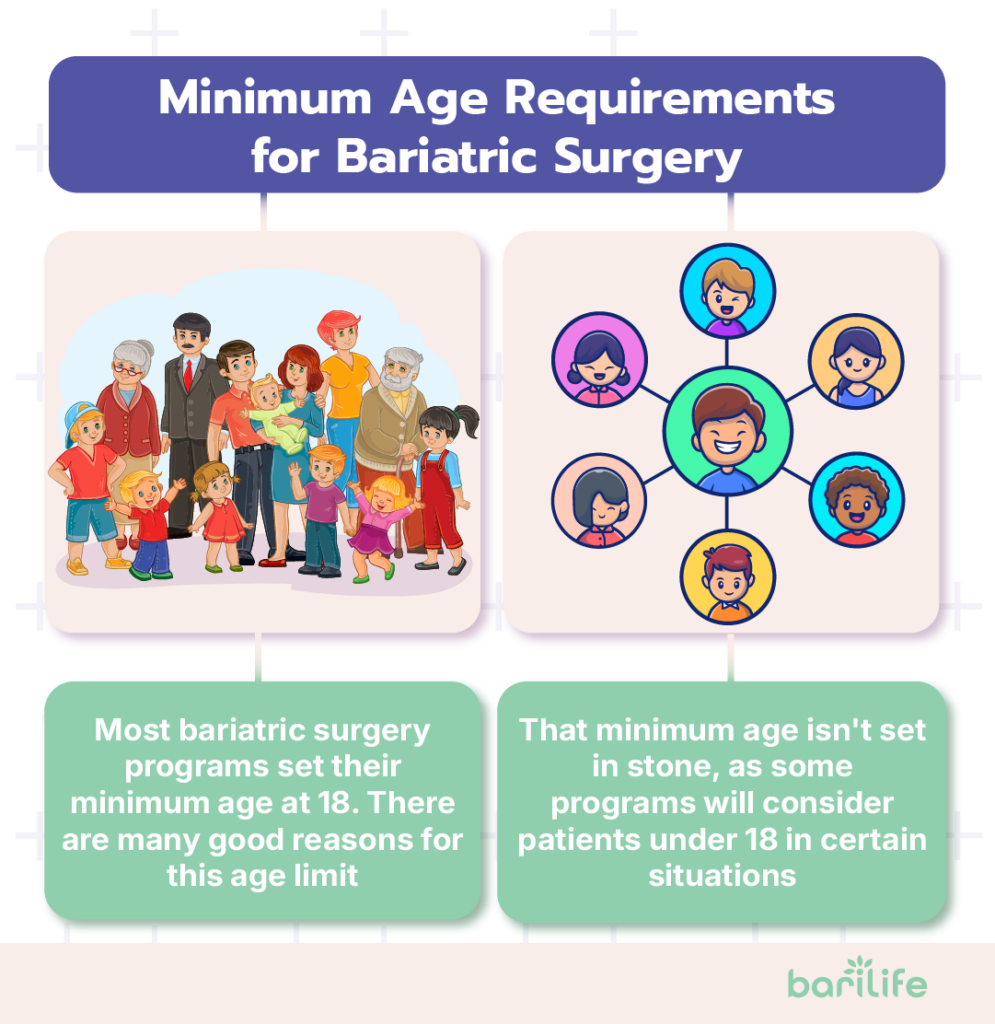
Most bariatric surgery programs set their minimum age at 18. There are many good reasons for this age limit. Your body is still developing during your teenage years, and doctors want to make sure you’re physically mature before making permanent changes to your digestive system. And remember that these changes could potentially affect growth and development.
The teen’s maturity is also considered. Bariatric surgery is a long-term commitment to major lifestyle changes. Healthcare providers want to be sure you’re mature enough to understand what you’re signing up for.
But that minimum age isn’t set in stone, as some programs will consider patients under 18 in certain situations, especially if:
- The teen has a BMI of over 40 (or over 35 with serious health problems related to weight)
- They have serious health issues caused by their weight that aren’t getting better with other treatments.
- Their family is supportive and involved in the decision
- The teen shows they’re mature enough to understand and commit to the process
In recent years, more doctors have become open to performing bariatric surgery at 16 or even younger for teenagers between the ages of 13 and 17 with severe obesity. But these cases are more carefully considered. So, while 18 is the general guideline, exceptions are possible with the right medical circumstances and support.
Some experts believe that the best age for bariatric surgery in teens may depend more on their physical and emotional maturity than their actual age. Programs offering adolescent bariatric surgery evaluate teens individually, focusing on long-term outcomes and readiness for change.
Maximum Age Limit for Bariatric Surgery
You might also wonder if you can be “too old” for weight loss surgery. There’s no upper age limit that automatically disqualifies older adults. Many weight loss surgery programs have performed surgery on patients in their 60s and 70s. Some centers even consider suitable candidates in their early 80s, though this is not as common.
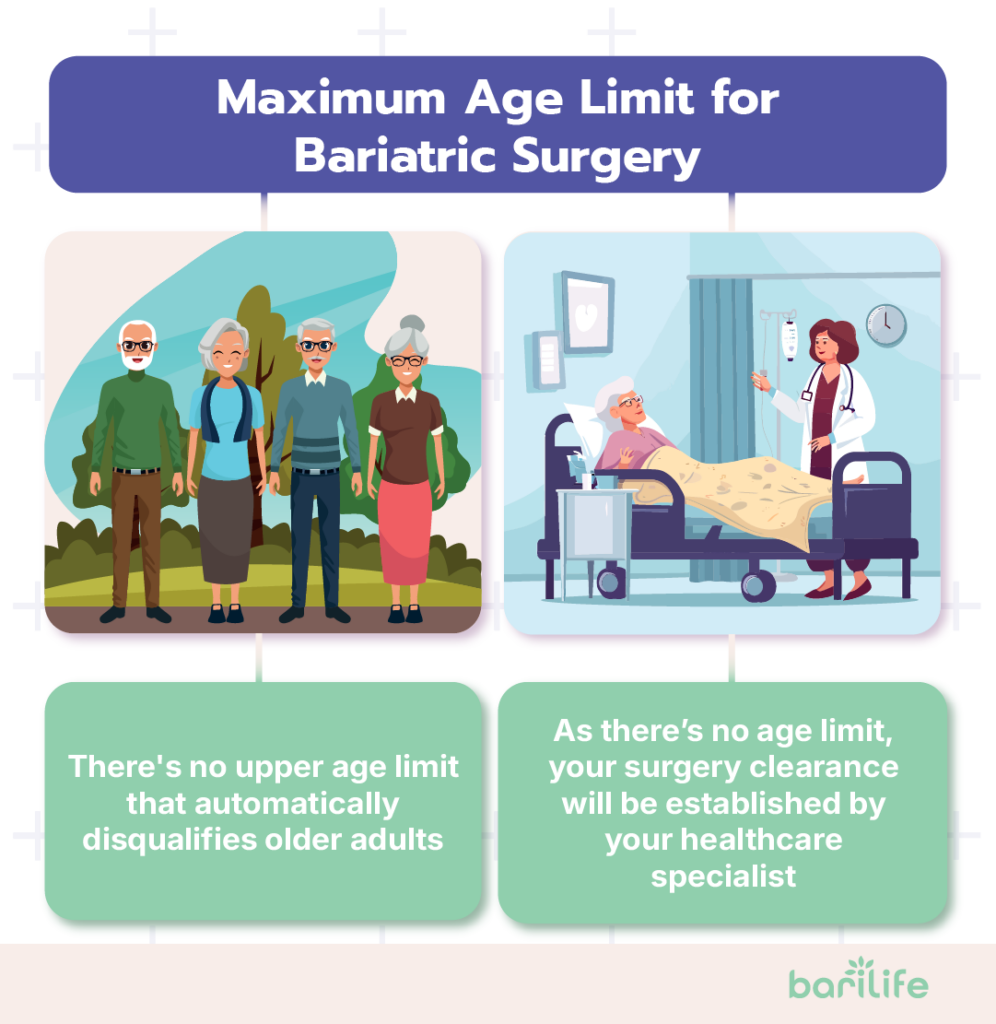
The lack of an upper age limit means that biological age (how well your body functions) can often differ from chronological age (actual age in years). Many older adults are in excellent health and can safely undergo surgery, while some younger people might have health complications that make surgery riskier.
However, certain factors do influence surgical decisions at this age:
- As you get older, recovery typically takes longer
- The risk of complications may increase with age
- Older patients often have more underlying health conditions
- The window of time to enjoy health benefits from weight loss may be shorter
For older adults, the focus is on overall health, surgical risk, and potential benefit. Bariatric surgery might still be recommended for an older adult if their obesity seriously impacts their quality of life and health and if the benefits clearly outweigh the risks.
Factors That Determine Eligibility Beyond Age
Aside from age, many other factors can also play a role in whether you are eligible for surgery:
- Body mass index (BMI): Your weight relative to your height matters a lot. Most programs need a BMI of 40+ (or 35+ if you have obesity-related health conditions like diabetes or high blood pressure).
- Overall health: Your overall physical health is also important. Doctors will look at your heart and lung function, how well your kidneys and liver work, whether conditions like high blood pressure and diabetes are under control, any previous surgeries you’ve had, and how well you can move around and function day to day.
- Mental health: Your mental health will also be evaluated. Surgeons need to know that you understand what the procedure involves and what lifestyle changes you’ll need to make. They’ll look at any history of mental health issues (especially eating disorders), whether you can follow complex medical instructions, and if you’re emotionally ready for the challenges after surgery.
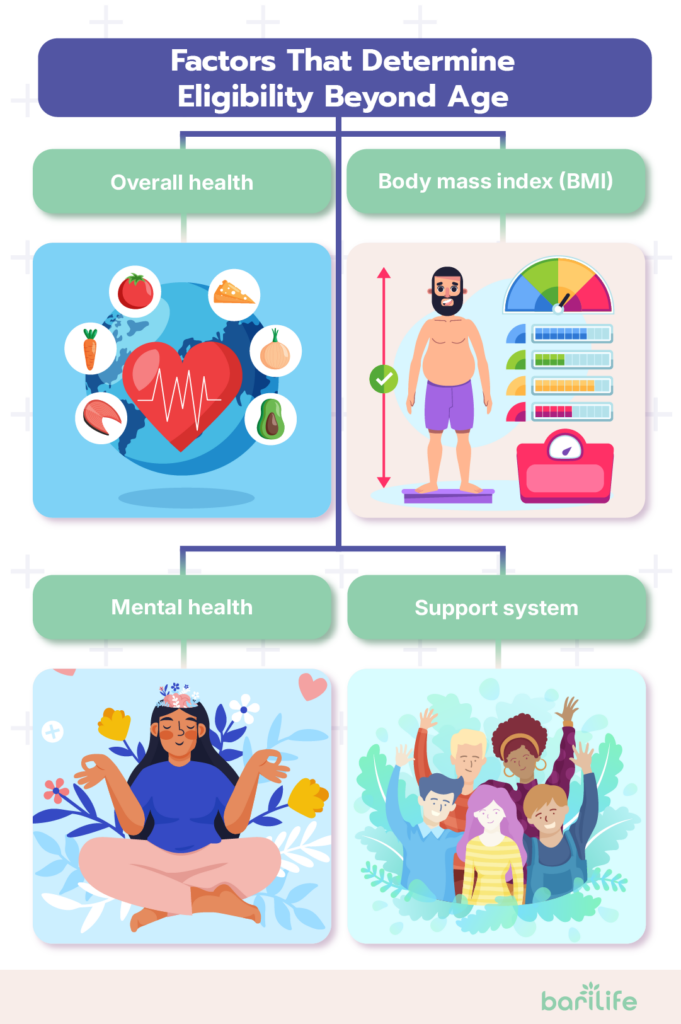
- Support system: Having a support system that can help you is essential. You’ll need help from family or friends for rides to appointments, assistance during recovery, emotional support as you adjust, and encouragement to stick with your new eating and lifestyle habits.
- Previous weight loss attempts: Doctors will want to see that you’ve seriously tried to lose weight through proper diet and physical exercise before considering surgery.
- Commitment to life-long changes: Most importantly, they need to know you’re willing and able to commit to lifelong follow-up care, taking vitamins, changing your diet, and regular physical activity.
Special Considerations for Older Patients
If you’re an older adult thinking about weight loss surgery, your healthcare team will look at several important factors.
- Daily life: For patients over 65, doctors will carefully assess your everyday abilities—how well you get around, whether you’re at risk for falls, how sharp your memory is, your nutritional health, and if you’re able to take medications correctly.
- Heart and lung function: Surgery becomes riskier as we age, so your doctors will be extra thorough. They’ll check your heart with specialized tests and evaluate your lung function. These steps help keep surgery as safe as possible.
- Current medications: If you take multiple medications, your doctors will plan for adjustments after surgery. This is important because weight loss surgery changes how your body absorbs medications.
- Life expectancy: Though it’s not always comfortable to discuss, doctors consider your life expectancy when making recommendations. Since the full health benefits of bariatric surgery typically take 1-2 years to appear, they want to ensure you’ll have time to enjoy these improvements.
- Rehabilitation needs: After surgery, you might need a longer hospital stay than younger patients. You may also require rehabilitation services, help at home during recovery, and more frequent follow-up appointments.
Despite these extra considerations, many older adults have excellent results from weight loss surgery.
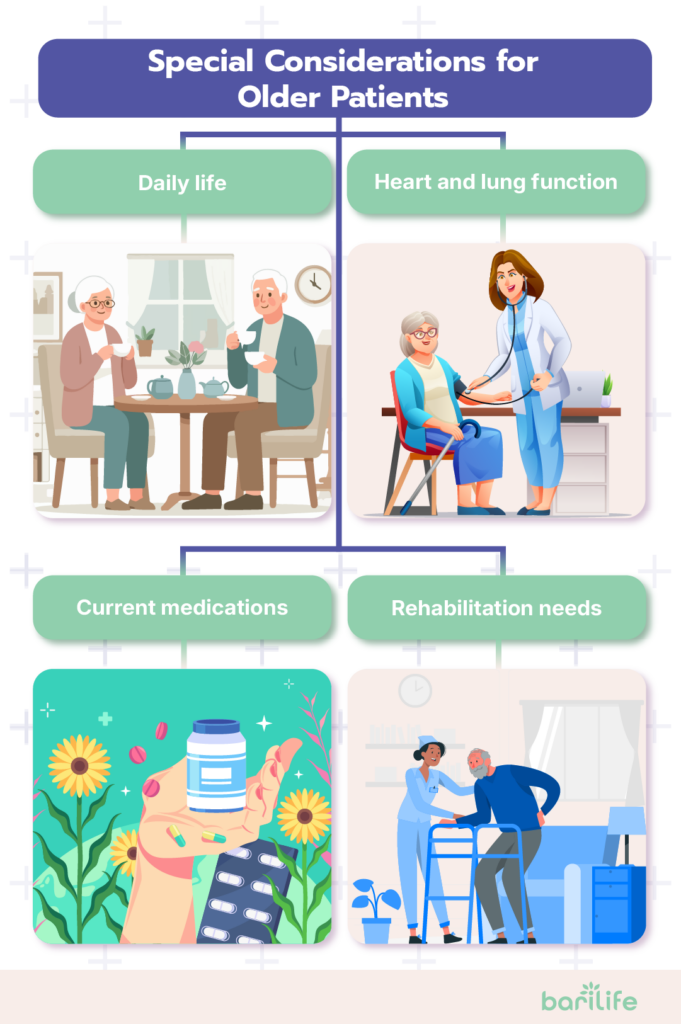
Pediatric and Adolescent Bariatric Surgery: Concerns to Consider
For younger patients, weight loss surgery involves unique considerations:
Surgery is generally only considered after puberty is complete or nearly complete to avoid interfering with growth and development. Teenagers must show they’re mature enough to understand long-term consequences, able to follow strict dietary guidelines, emotionally ready for body changes, and realistic about outcomes.
Parental support is crucial. Parents must be involved in the decision, the home environment needs to support healthy eating, the family must commit to attending all appointments, and parents need to understand the emotional challenges their adolescent may face.
Adolescent weight loss surgery is best performed at centers with specific expertise in pediatric weight management and support services. Teens require particularly careful long-term monitoring for nutritional deficiencies that could affect development, psychological adjustment, appropriate weight loss, and taking supplements as directed.
The medical community continues to debate the ethics of performing permanent surgical procedures on young people who may not fully understand the lifelong consequences.
Conclusion
While age is considered in bariatric surgery decisions, there’s no universal cutoff that automatically qualifies or disqualifies you.
The best approach is to consult with a bariatric surgeon who can provide personalized guidance based on your unique situation rather than focusing solely on your age.
How Bari Life Can Help
Bari Life provides comprehensive support for bariatric patients at every stage of their journey. From essential bariatric vitamins and supplements to expert guidance on nutrition and recovery, Bari Life ensures you have the tools you need for long-term success.
Whether you’re looking for bariatric multivitamins, bariatric protein shakes, or even bariatric calcium chews, Bari Life offers a wide range of products tailored to your needs. For those who prefer easier-to-digest options, we also provide bariatric vitamins chewable and liquid bariatric vitamin formulas.
Need to manage your protein intake? Choose from our delicious bariatric protein bars and bariatric snacks designed to keep you feeling full and satisfied. To support digestive health, Bari Life also includes options like a high-quality bariatric probiotic.
Hair thinning after surgery? Our specialized bariatric vitamins for hair loss are formulated to help you restore and maintain healthy hair. And for patients needing additional nutrients, our bariatric multivitamin with iron ensures comprehensive coverage in one convenient dose.
Ready to take the next step in your weight loss journey? Visit Bari Life to explore our resources and find the support you need to thrive after bariatric surgery.
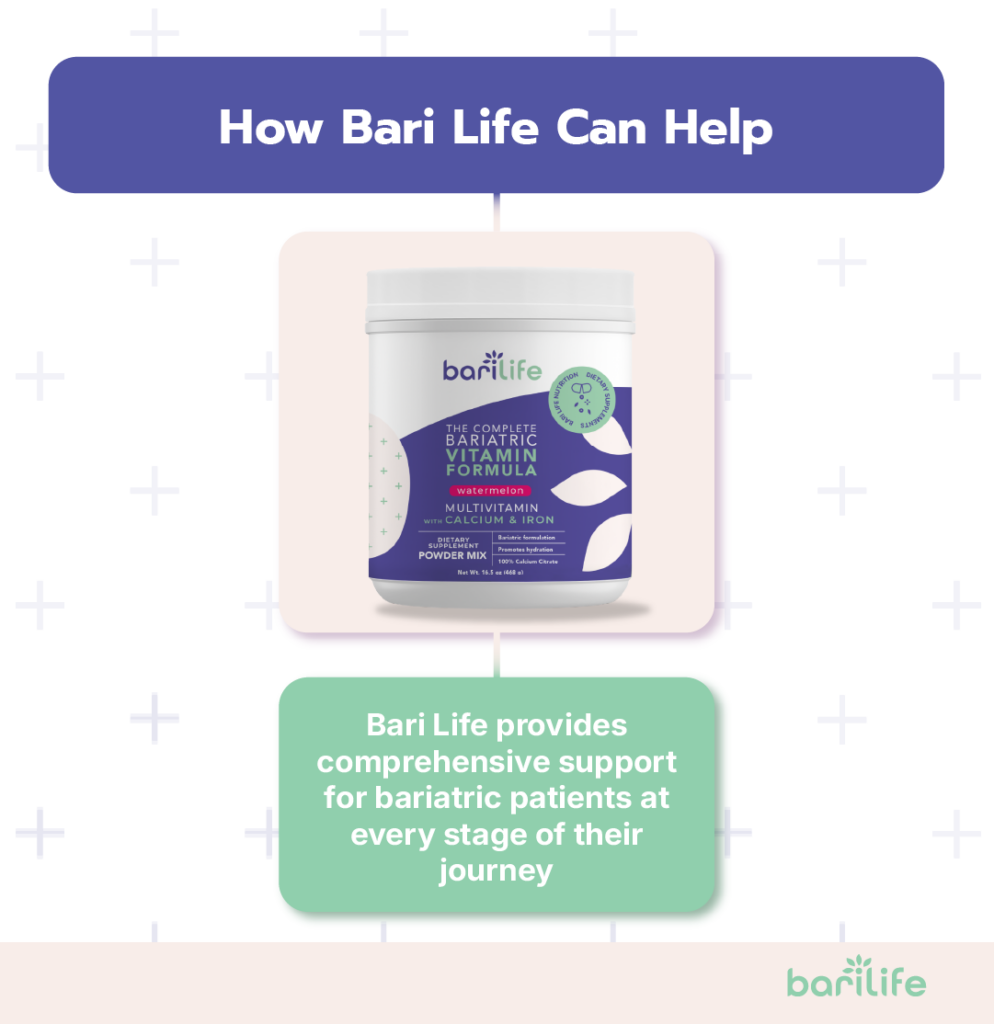



What are your tips and tricks to post-bariatric success?